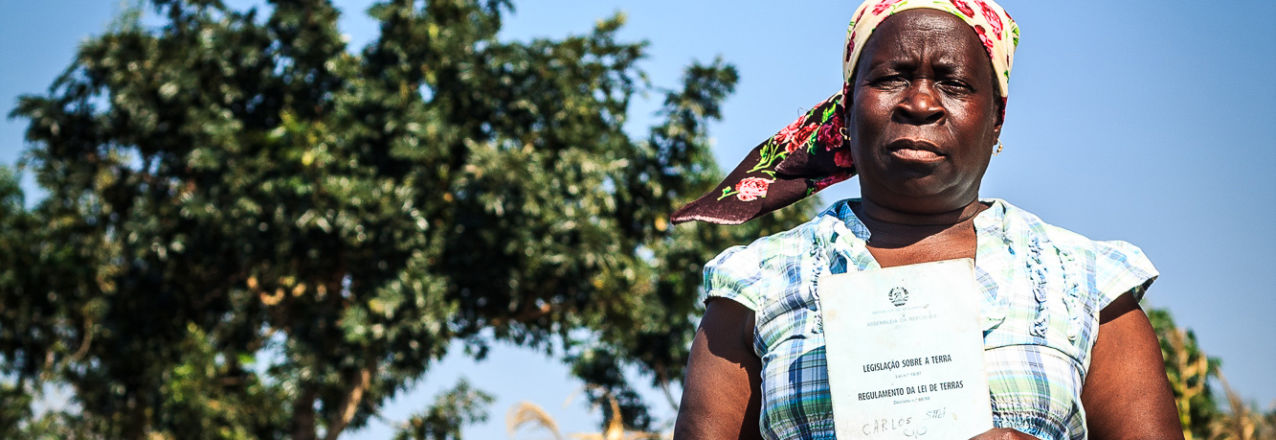USAID is partnering with the private sector to better understand and mitigate land tenure risks associated with agribusiness investments in the developing world. Through these partnerships, USAID is working to secure legitimate land rights and to improve livelihoods and other outcomes for communities in the investment areas. Pilot activities are currently being undertaken in Mozambique, Kenya and Ghana.
USAID is working with Coca-Cola’s largest sugarcane supplier in Sub-Saharan Africa, Illovo Sugar, Ltd., in the area surrounding its 6,000-hectare sugarcane plantation in Mozambique. The partnership is actively striving to: build a better understanding at the community level of Mozambique’s land laws; map and record the land rights of smallholders; support participatory land use planning for members of a farmers’ association; and create an open and accessible grievance mechanism for community members. Through this work, USAID is helping Illovo implement its commitments to zero tolerance for land grabs and land rights abuses while at the same time strengthening farmers’ land rights and incentives to invest in their land. As the Government of Mozambique works to meet its ambitious goal of issuing five million land certificates by 2019, this project could provide a low-cost approach to scale community land mapping.
USAID is working with the Moringa Partnership, a European investment firm that focuses on socially responsible investment, to improve its due diligence processes related to land. In Kenya, USAID and Moringa are conducting enhanced due diligence for an investment in a veneer and ginger oil company. The company is considering expanding its operations by purchasing or leasing land and working with outgrowers, and it would like to assess the potential impact of any expansion. Given the historic, complex issues around land in Kenya and the frequency of conflicts over land, it is important to understand the pattern of land holding in the target area over time using participatory appraisal techniques. This should help to identify possible flash points for conflicts and allow procedures to be implemented to avoid such conflict. This will be complemented by an in-depth analysis of environmental impacts of the project – including use of and access to water. With a more nuanced understanding of the land holdings, legitimate rights holders, and potential environmental impacts, Moringa should be better equipped to work with the local company to address any land-based concerns and improve the prospects for a profitable and sustainable investment. Local communities should also benefit from strengthened land rights and the new opportunity to sell timber and ginger to the company.
USAID is partnering with Hershey’s and its local cocoa supplier, ECOM Trading, to improve tenure security and productivity for smallholder cocoa farmers while also reducing deforestation and degradation. The pilot is strengthening farmers’ land and tree rights and rehabilitating their older, less productive cocoa farms. USAID is mapping farms and clarifying lease agreements between tenant farmers and customary landowners. Meanwhile, ECOM is working with farmers to co-manage the replacement of old cocoa trees and the upkeep of new seedlings on portions of their farms. With stronger land and tree rights, farmers will have a greater incentive to increase sustainable cocoa production through the use of shade trees. If successful, the pilot could be scaled across Ghana to assist the government in achieving its dual goals of increasing cocoa productivity and reducing Greenhouse Gas emissions from the cocoa sector.
By promoting responsible land-based investing, USAID is working to promote sustainable economic growth and enhanced resilience. This work also builds on USAID’s Operational Guidelines for Responsible Land-Based Investments, which provide information on how to conduct due diligence, consultations, negotiations, and other community engagement efforts to improve land investments in foreign countries. More specifically, the pilots are testing the usefulness of the Analytical Framework for Responsible Land Based Investments, which draws on the Operational Guidelines and was developed by the New Alliance for Food Security and Nutrition and Grow Africa. Through these pilots, USAID will develop tools that other investors can adapt for their own due diligence processes and to comply with the Voluntary Guidelines on the Responsible Governance of Tenure of Land, Fisheries and Forests in the Context of National Food Security. The Agency will also share lessons learned so many more investors can build on and improve the process of engaging with local women and men on issues related to using land and resources.


